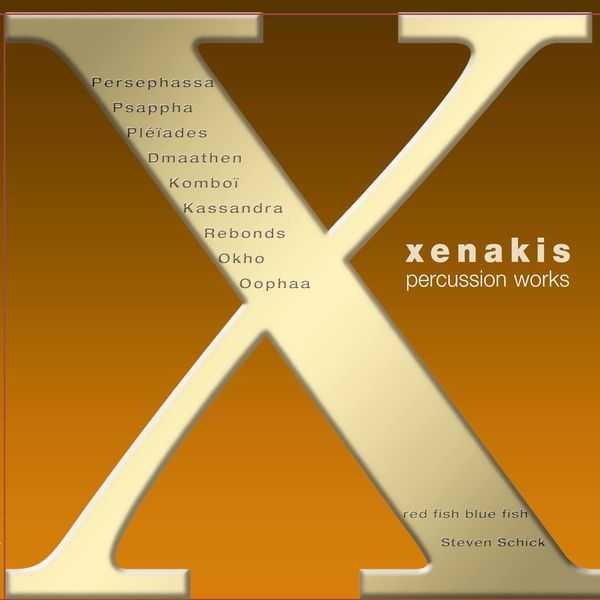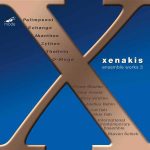
Composer: Iannis Xenakis
Performer: Red Fish Blue Fish, Steven Schick, Jacqueline Leclair, Shannon Wettstein, Kassandra Philip Larson, John Mark Harris
Conductor: Steven Schick
Number of Discs: 3
Format: FLAC (tracks)
Label: Mode
Catalogue: mode171-173
Release: 2007
Size: 830 MB
Recovery: +3%
Scan: cover
CD 01
01. Persephassa
02. Psappha (Iannis Xenakis)
03. Dmaathen
CD 02
Pléïades
01. I. Melanges
02. II. Metaux
03. III. Claviers
04. IV. Peaux
05. Komboï
CD 03
01. Kassandra
02. Okho
03. Ophaa
Rebonds
04. A
05. B
For many of Iannis Xenakis’ fans, his percussion works have served as practical introductions to his methods and ideas; yet they are also valued for their accessibility, bracing vitality, and amazing virtuosity. Much of Xenakis’ music challenges the listener because the underlying mathematical theories, complex networks of lines, dense textures, and abrasive dissonances are a lot to take in. However, his percussion works are considerably easier to absorb than, say, the ritualistic theater pieces, the dynamic orchestral scores, or even some of his cutting-edge chamber music, because their strong rhythmic emphasis provides a handle that most listeners can easily grasp. The compositions for solo percussion, such as Psappha (1975) and Rebonds B/A (1989), are showstoppers for Steven Schick, who performs both with astonishing accuracy and stunning force. Schick also presents several of Xenakis’ exploratory pieces for percussion with pitched instruments, and his performances with oboist Jacqueline Leclair in Dmaathen (1977), harpsichordists Shannon Wettstein in Komboï (1981) and John Mark Harris in Oophaa (1989), and vocalist Philip Larson in Kassandra (1987) are as intensely expressive as they are precisely executed. But the real powerhouses on this triple-disc set from Mode are the ensemble works — Persephassa (1969), Pléïades (1978), and Okho (1989) — which the brilliant percussion ensemble Red Fish Blue Fish delivers with fierce concentration and exciting volatility. This comprehensive package is one of the most rewarding in Mode’s series of Xenakis’ oeuvre, and his admirers should snap up this excellent package without hesitation.
All credit to Red Fish Blue Fish and their director Steven Schick for their dedication in realising some of the most visceral and exhilarating music yet written for percussion. The eight works cover two decades (1969-89) of Xenakis’s 45-year career.
The earliest, Persephassa, takes up the challenge of Varèse and Cage in a sextet whose combining freedom and discipline is only to be expected from one who used mathematical formulae to create music of uninhibited abandon. It is a measure of Xenakis’s building on recent tradition that the solo Psappha (1975) draws on the example of Stockhausen’s Zyklus in its pursuing of a methodical yet inherently dynamic trajectory, while Pleïades (1978) might be a riposte to Reich’s Drumming in its systematic working-through of a formal process denoted by specific percussive ‘types’ – for all that Xenakis’s explosive energy is worlds away from Reich’s calm incremental change.
In between comes Dmaathen, its juxtaposing of percussion and oboe in a tense yet lyrical dialogue anticipating the duets of the 1980s.
These comprise two with harpsichord – the bewitching interplay of sonorities in Komboï, and restrained rhythmic overlay of Oophaa – and one with voice in Kassandra, whose plangent declamation is less a prophecy of doom than an abstract evocation of tragedy. The latest works eschew flamboyance, yet the trio Okho is an imaginative stylisation of West African drumming, while the two-part solo Rebonds (played B-A) acutely balances sound and silence so to compel admiration.
These pieces exist in often several recordings, but this Mode set has a completeness and, above all, a conviction as regards performance. Sound is excellent and Schick’s superb booklet essay has a depth of insight to mirror that of the playing.
Essential.



